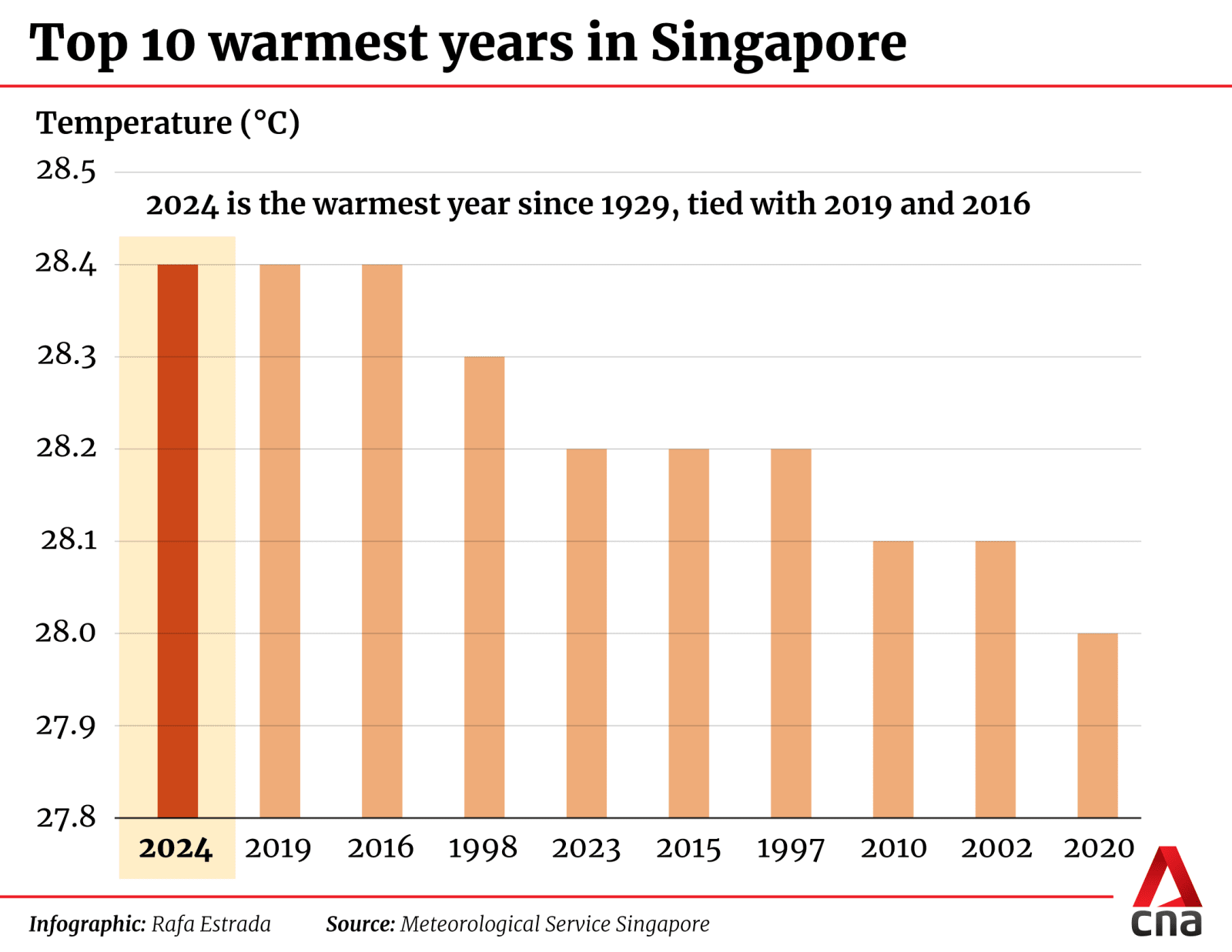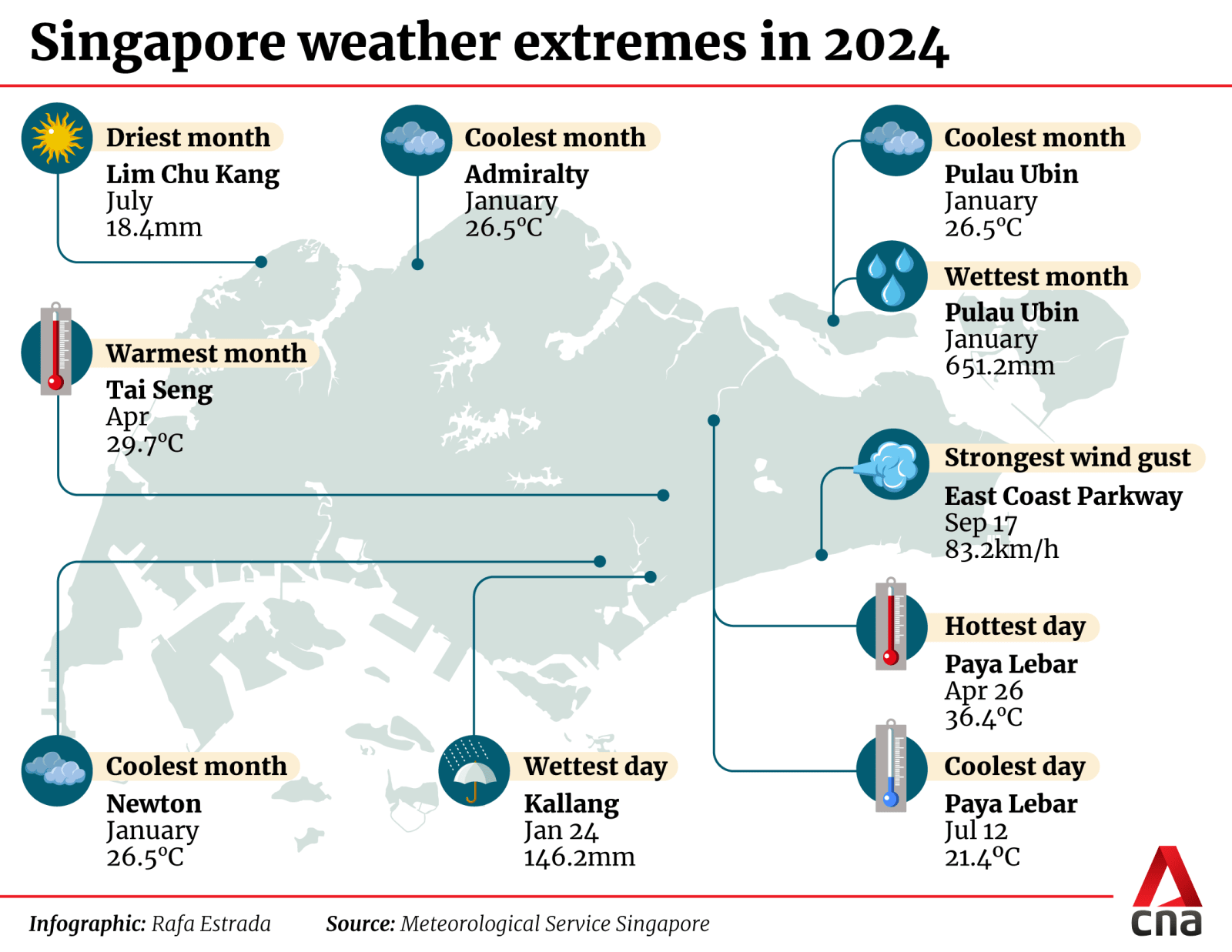2024 was Singapore's joint-warmest year on record; temperature highs in April, July and December

Two women sharing an umbrella under the hot weather in Singapore. (Photo: CNA/Syamil Sapari)

This audio is generated by an AI tool.
SINGAPORE: Last year was Singapore’s warmest on record, tied with 2019 and 2016, the Meteorological Service Singapore said on Friday (Jan 10).
All months recorded temperatures that were equal to or above their respective long-term averages, according to the Met Service’s Singapore Climate 2024: The Year in Numbers report.
The 2023/2024 El Nino event contributed to Singapore’s warmer temperatures in 2024, as well as rainfall earlier in the year.
April was the warmest month last year and also the warmest April on record.
The month’s mean temperature of 29.4 degrees Celsius was 1.2 degrees Celsius above the long-term average and tied with 2016 as the warmest April on record, said the report.
April 2024’s mean daily minimum temperature of 26.7 degrees Celsius also tied with 2016 for the highest April mean daily minimum temperature.

HOT DAYS
July was the second warmest month in 2024.
It was also the warmest July on record - its mean temperature of 29.3 degrees Celsius was 1.1 degrees Celsius above the long-term average for the month and surpassed the previous warmest July recorded in 2015 by 0.2 degrees Celsius.
The month’s mean daily minimum temperature of 27.1 degrees Celsius also broke the previous July record of 26.9 degrees Celsius set in 2019, said the Met Service.
Last year also saw the warmest December on record.
“While December 2024 was one of the cooler months of the year, it was the warmest December on record with monthly mean temperature of 27.7 degrees Celsius, tying with 2015 and 2021,” according to the report.
The mean daily maximum temperature of 31.7 degrees Celsius in December broke the previous record of 31.6 degrees Celsius recorded in 2016 and 2018.
Changi climate station’s highest daily maximum temperature for the month of December was broken by a wide margin on Dec 7, 2024, when the station recorded a temperature of 35.6 degrees Celsius. This exceeded the previous record of 33.9 degrees Celsius set on Dec 1, 2021, by 1.7 degrees Celsius.
The highest temperature recorded that day was 36.2 degrees Celsius at Paya Lebar, which also broke the record for December’s highest daily maximum temperature across all stations.
Amid the sweltering weather, Singapore experienced 21 days of high heat stress last year with most of these days occurring in March, April and May.
The highest 15-minute average Wet-Bulb Globe Temperature (WBGT) in 2024 was 34.4 degrees Celsius, recorded at Bishan Stadium on Mar 7 and at Bedok Stadium on May 28.
WBGT is a measure of heat that reflects the main environmental factors contributing to heat stress, such as air temperature, humidity, wind speed and solar radiation.
A day of high heat stress is defined when any hourly-average WBGT at a station is equal to or greater than 33 degrees Celsius. Warm temperatures coupled with other factors such as humidity, wind speed and solar radiation contribute to occurrences of high heat stress.
MONTHLY RAINFALL "HIGHLY VARIABLE"
Singapore’s annual total rainfall averaged across the country’s 32 stations at 2739.8mm – the 12th highest since 1980 and 8.1 per cent above the long-term average.
Changi climate station recorded 2432mm of rainfall in 2024, 15.1 per cent above its long-term average.
The country’s monthly rainfall last year was “highly variable”, said the report.
Singapore experienced a dry spell of 18 days between Jul 13 and Jul 30, 2024, with average rainfall coming in at 84.6mm – 52.7 per cent below long-term average.
The dry weather continued into August, with average rainfall at 120.8mm.

After the drier period, November 2024 broke the record for the wettest November since 1980, with average rainfall coming in at 419mm.
This was 47.4 per cent above its long-term average and exceeded the previous highest November rainfall of 390.1mm recorded in 1992.
January 2024 was also a wet month, with its average rainfall of 407.5mm about 83.3 per cent above the month’s long-term average.
Average rainfall for the following months – February, March and April – dropped below their long-term averages.
More rain fell over Singapore in May and June, with average rainfall coming in at 35.8 per cent and 58.2 per cent above their respective long-term averages.
The year ended on a drier note, with December 2024’s average rainfall of 221.3 mm about 30 per cent below its long-term average.


















